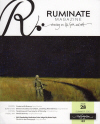Ruminate – Summer 2013
This issue of Ruminate is titled “not forgotten” and contains stories and poems of memories and of preserving them. Editor Brianna Van Dyke writes, “it is not our memories that give us solace, but rather the promise that we are not forgotten, that with tender mercy the morning sun rises upon us. I try remembering, try holding it all—the hard truths and the good truths, together.”
This issue of Ruminate is titled “not forgotten” and contains stories and poems of memories and of preserving them. Editor Brianna Van Dyke writes, “it is not our memories that give us solace, but rather the promise that we are not forgotten, that with tender mercy the morning sun rises upon us. I try remembering, try holding it all—the hard truths and the good truths, together.”
Easily my favorite piece in this issue is Lindsey Deloach Jones’s “Fall in Love, Lourdemie” (which also holds second place for the 2013 VanderMey Nonfiction Prize), a chronicled experience of when Jones takes a young Haitian girl into her home for a short period of time as the girl has surgery for club foot. Unable to have her own child, Jones gives Lourdemie love, even if Lourdemie can’t fully understand what the words “I love you” mean:
Now every night at bedtime when I say to Lourdemie, “I love you, see you in the morning,” she repeats it back to me . . . totally unaware of how the phrases would translate. To her the words are a string of syllables, our evening refrain. She only knows that I say them every night when I pull the covers up to her shoulders and rub my thumbs across her perfect eyebrows before kissing her forehead. They do not sound like what her mother said to her every night. But they mean something to her; they mean enough to bear repeating.
This story is about understanding because here, understanding isn’t found through language—as they don’t speak the same one: “Language is a shortcut to gratification, a way to get what we want without the wait.” Connection is instead found as Jones tries to understand Lourdemie through other means. But even though she may not understand everything Lourdemie needs and even though she cannot keep her forever, in the end, Jones can still be a mother right now, scraping “sandwich crusts into the trash can like a mother would do.”
The only fiction piece, “The Creché Lady” by S. Frederic Liss, is certainly worth the investment. Carla “Waddy” Pelletier is a taxidermist, and when a couple brings in a long-tailed weasel in its winter coat, she can’t think of a better challenge of her skills. That is, until Leona McFall, the owner of the breakfast diner next door, brings Carla her recently deceased human baby:
Where would she make the skinning incisions? Pray had no body hair to hide the cuts and stitches. How would she peel skin so thin and flimsy without tearing it? . . . Would it survive fleshing and shaving? Or tanning? . . . And she would have to do everything right the first time. No second chances. No opportunity to practice her technique, to experiment, to see what worked, what didn’t.
Liss certainly gives an original tale, well told.
Sarah Green’s poem “What to Expect When You Become a Traffic Light” is also imaginative. Combining elements of yellow, green, red, and that “orange” we all speed through, this second-person poem predicts how you would feel:
In thunderstorms, you’ll whiplash furiously.
When the electricity’s out anywhere, even
across the ocean, you’ll swear
you feel that.
In her poem “Whispered,” Lynn Domina personifies Mercy as a woman she would “like to offer a cup of coffee.” The word choice and pace makes this poem soft, and I feel the need to whisper, to gently ask for mercy instead of to cry out:
I could turn
and whisper her name. Mercy, I could say,
and she would lift her eyes, her gaze
resting on my face as I felt
my body lighten, the word
eased from my lips, Mercy, Mercy.
Another short poem, Sarah Fawn Montgomery’s “Scar,” gives a glimpse of loss as the narrator skins her ankle in the shower the day after her grandmother dies. She covers the cut with her finger, “held it closed to clot,” and compares it to the way her grandmother hid her despair: “I can feel my heartbeat / fast in my finger.”
Not realizing until I read the editor’s note that this was an issue about remembrance, and not really picking up on the link until I was reading the poetry, I found this issue to be about more than just preserving a memory. I found it to be about finding human connection, about trying to understand someone else’s world. So step inside, and start reading.
[www.ruminatemagazine.com]





